How does sun exposure affect skin?

It doesn’t have to be sunny either, and UV damage is possible on overcast days too.
Sunshine can have both positive and negative effects on your skin, depending on the amount of exposure and protective measures taken. Here's a breakdown:
Positive effects:
Vitamin D production: Sunlight is a natural source of vitamin D, which is essential for overall health. When your skin is exposed to UVB rays from the sun, it can produce vitamin D, which plays a crucial role in calcium absorption and bone health.
But you only need a little sun to give you all the Vitamin D you need.
So, stay out of the sun when it’s hottest, and get a little sunshine in the cooler times of the day –particularly in winter, when Vitamin D levels can get low!
Sunshine also helps you create Vitamin D which is important for mood, immunity and bone strength.
Negative effects:
Sunburn: Excessive sun exposure, especially without protection, can cause sunburn. Sunburn is a painful condition characterized by red, inflamed skin that can blister and peel. It increases your risk of skin cancer, particularly melanoma.
Premature aging: Prolonged exposure to UV radiation from the sun can lead to premature aging of the skin. This includes wrinkles, fine lines, age spots, and a loss of skin elasticity.
Skin cancer: UV radiation is a known carcinogen and is the primary cause of most skin cancers, including melanoma, basal cell carcinoma, and squamous cell carcinoma. Overexposure to the sun, especially with a history of sunburn, can significantly increase your risk of skin cancer.
Damage to skin cells: UV radiation can damage the DNA in skin cells, which can lead to mutations and the development of cancerous cells over time.
To protect your skin while enjoying the benefits of sunshine, follow these recommendations:
Use sunscreen: Apply broad-spectrum sunscreen with an SPF of at least 30 to exposed skin, even on cloudy days.
Wear protective clothing: Cover your skin with long-sleeved shirts, wide-brimmed hats, and sunglasses with UV protection.
Seek shade: Limit your time in direct sunlight, especially during peak UV hours (usually between 10 a.m. and 4 p.m.).
Avoid tanning beds: Tanning beds emit UV radiation and can increase your risk of skin cancer and premature aging.
Regular skin checks: Perform self-exams of your skin and see a dermatologist for regular skin screenings to detect any potential skin issues early.
via Original Source
Comments
Post a Comment